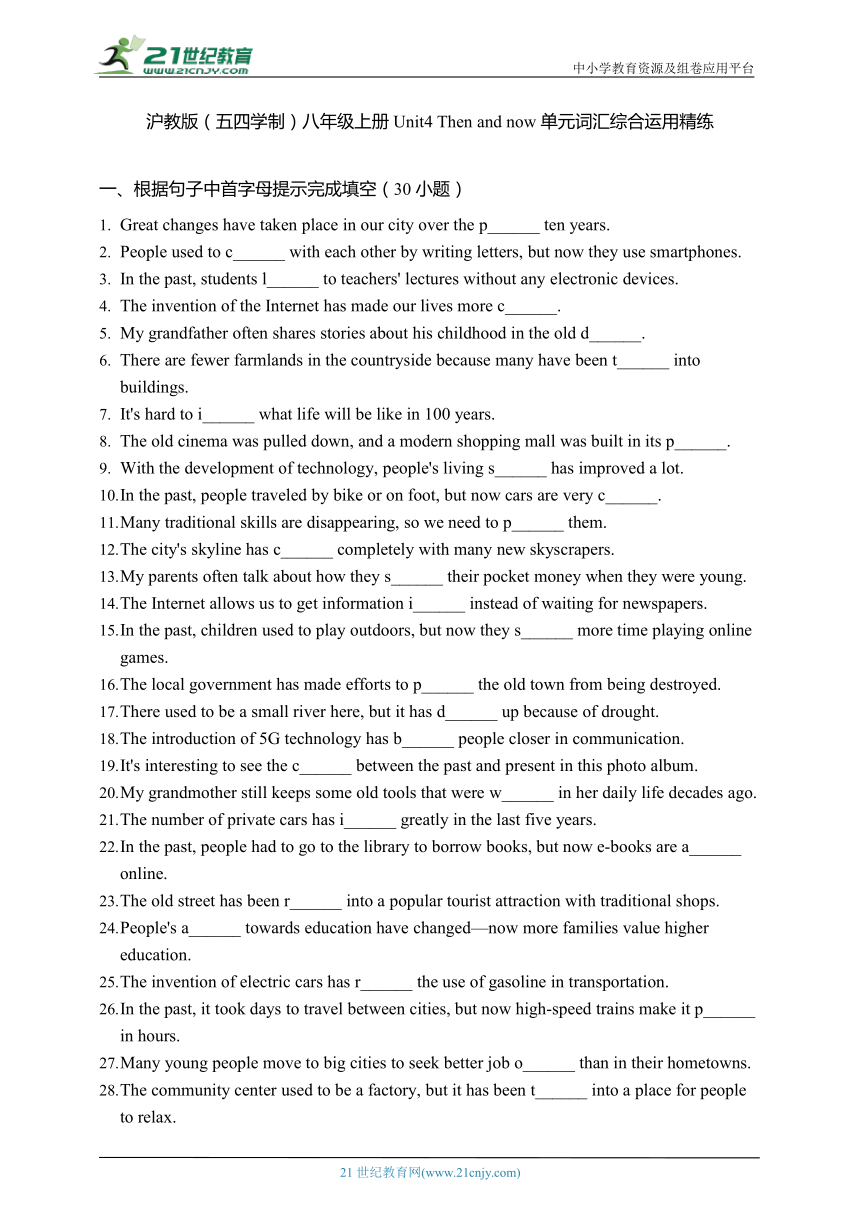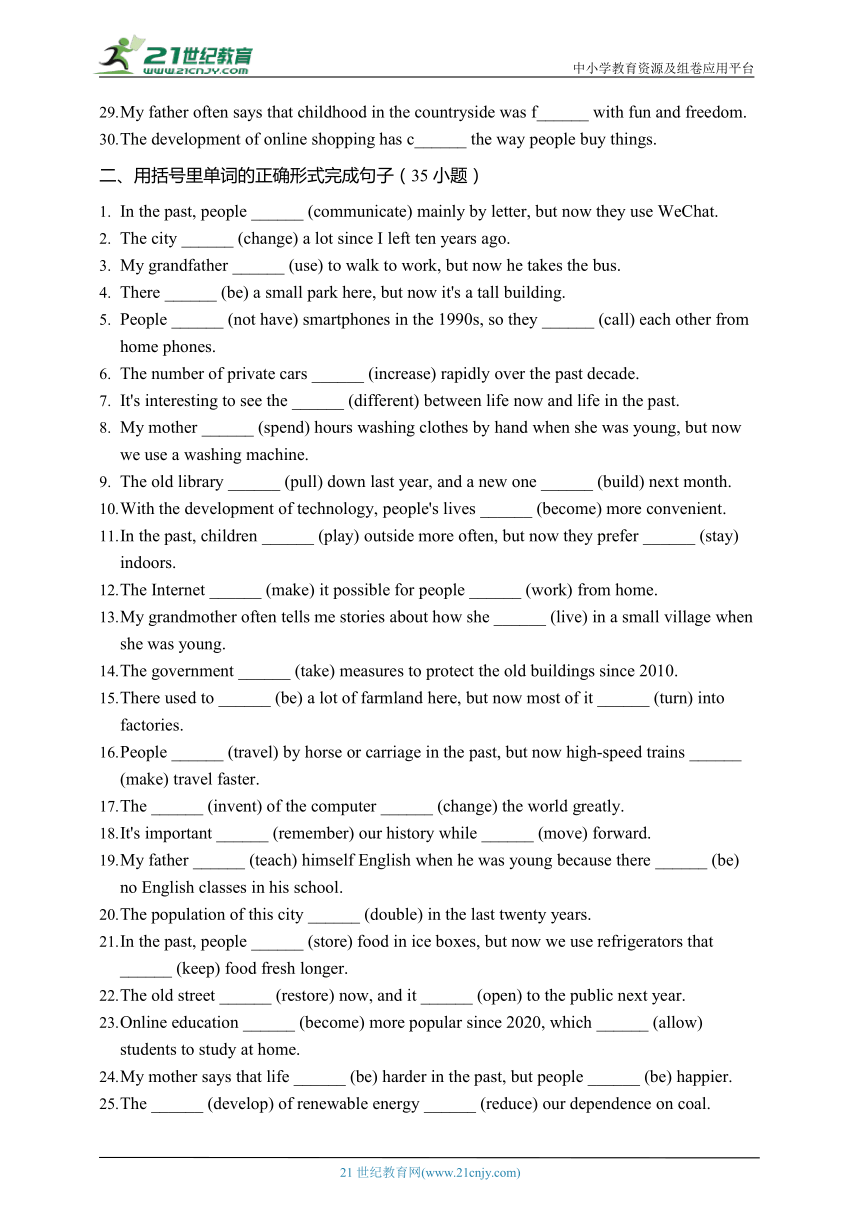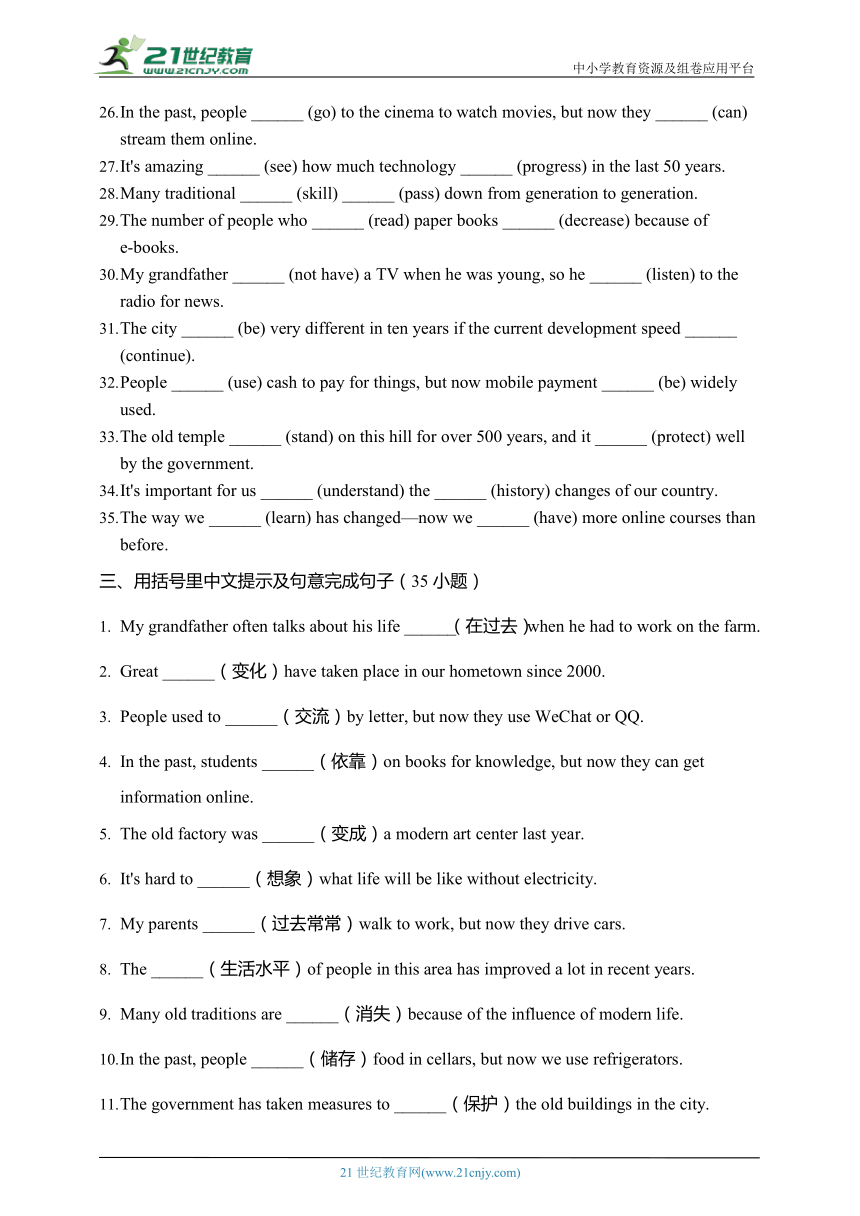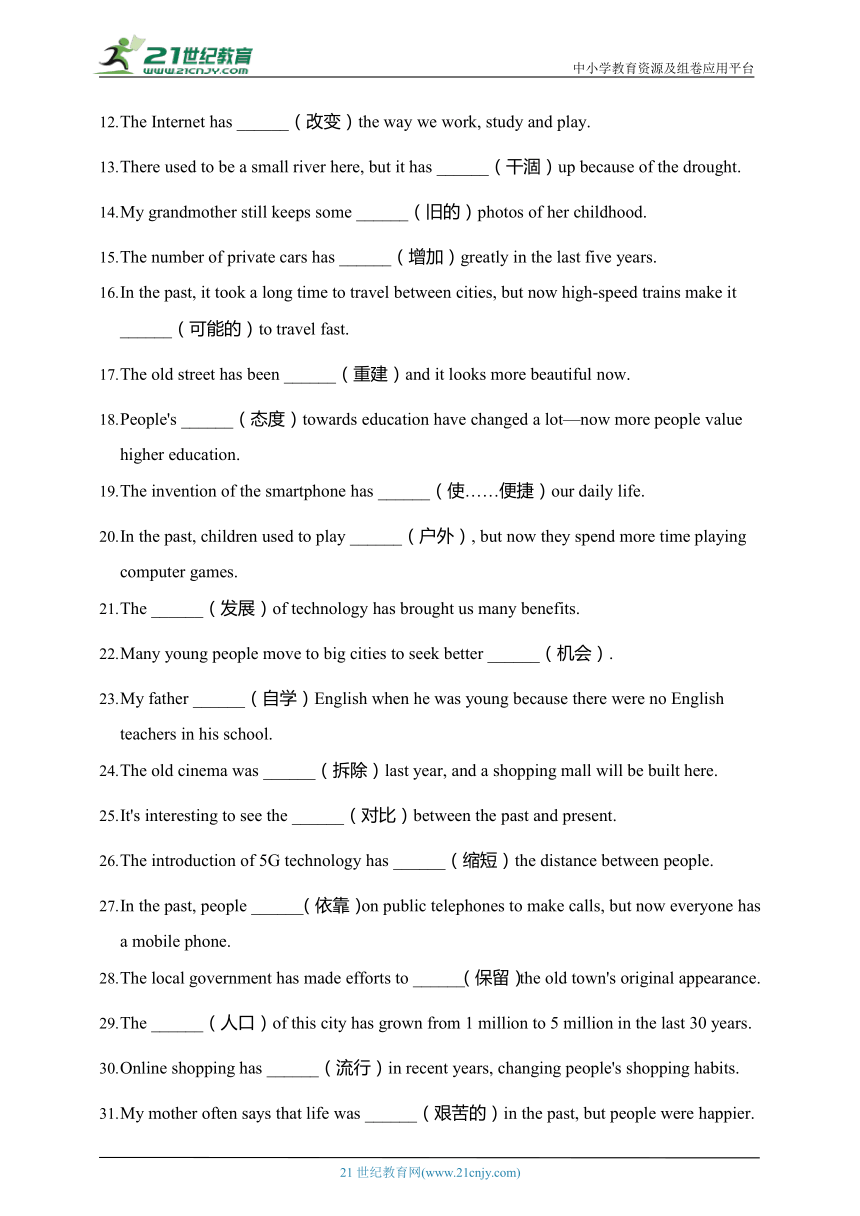Unit4 Then and now单元词汇综合运用精练(含答案解析)—沪教版(五四学制)八年级英语上册
文档属性
| 名称 | Unit4 Then and now单元词汇综合运用精练(含答案解析)—沪教版(五四学制)八年级英语上册 |  | |
| 格式 | docx | ||
| 文件大小 | 56.6KB | ||
| 资源类型 | 试卷 | ||
| 版本资源 | 沪教版(五四学制) | ||
| 科目 | 英语 | ||
| 更新时间 | 2025-08-04 16:57:12 | ||
图片预览




文档简介
中小学教育资源及组卷应用平台
沪教版(五四学制)八年级上册Unit4 Then and now单元词汇综合运用精练
一、根据句子中首字母提示完成填空(30小题)
Great changes have taken place in our city over the p______ ten years.
People used to c______ with each other by writing letters, but now they use smartphones.
In the past, students l______ to teachers' lectures without any electronic devices.
The invention of the Internet has made our lives more c______.
My grandfather often shares stories about his childhood in the old d______.
There are fewer farmlands in the countryside because many have been t______ into buildings.
It's hard to i______ what life will be like in 100 years.
The old cinema was pulled down, and a modern shopping mall was built in its p______.
With the development of technology, people's living s______ has improved a lot.
In the past, people traveled by bike or on foot, but now cars are very c______.
Many traditional skills are disappearing, so we need to p______ them.
The city's skyline has c______ completely with many new skyscrapers.
My parents often talk about how they s______ their pocket money when they were young.
The Internet allows us to get information i______ instead of waiting for newspapers.
In the past, children used to play outdoors, but now they s______ more time playing online games.
The local government has made efforts to p______ the old town from being destroyed.
There used to be a small river here, but it has d______ up because of drought.
The introduction of 5G technology has b______ people closer in communication.
It's interesting to see the c______ between the past and present in this photo album.
My grandmother still keeps some old tools that were w______ in her daily life decades ago.
The number of private cars has i______ greatly in the last five years.
In the past, people had to go to the library to borrow books, but now e-books are a______ online.
The old street has been r______ into a popular tourist attraction with traditional shops.
People's a______ towards education have changed—now more families value higher education.
The invention of electric cars has r______ the use of gasoline in transportation.
In the past, it took days to travel between cities, but now high-speed trains make it p______ in hours.
Many young people move to big cities to seek better job o______ than in their hometowns.
The community center used to be a factory, but it has been t______ into a place for people to relax.
My father often says that childhood in the countryside was f______ with fun and freedom.
The development of online shopping has c______ the way people buy things.
二、用括号里单词的正确形式完成句子(35小题)
In the past, people ______ (communicate) mainly by letter, but now they use WeChat.
The city ______ (change) a lot since I left ten years ago.
My grandfather ______ (use) to walk to work, but now he takes the bus.
There ______ (be) a small park here, but now it's a tall building.
People ______ (not have) smartphones in the 1990s, so they ______ (call) each other from home phones.
The number of private cars ______ (increase) rapidly over the past decade.
It's interesting to see the ______ (different) between life now and life in the past.
My mother ______ (spend) hours washing clothes by hand when she was young, but now we use a washing machine.
The old library ______ (pull) down last year, and a new one ______ (build) next month.
With the development of technology, people's lives ______ (become) more convenient.
In the past, children ______ (play) outside more often, but now they prefer ______ (stay) indoors.
The Internet ______ (make) it possible for people ______ (work) from home.
My grandmother often tells me stories about how she ______ (live) in a small village when she was young.
The government ______ (take) measures to protect the old buildings since 2010.
There used to ______ (be) a lot of farmland here, but now most of it ______ (turn) into factories.
People ______ (travel) by horse or carriage in the past, but now high-speed trains ______ (make) travel faster.
The ______ (invent) of the computer ______ (change) the world greatly.
It's important ______ (remember) our history while ______ (move) forward.
My father ______ (teach) himself English when he was young because there ______ (be) no English classes in his school.
The population of this city ______ (double) in the last twenty years.
In the past, people ______ (store) food in ice boxes, but now we use refrigerators that ______ (keep) food fresh longer.
The old street ______ (restore) now, and it ______ (open) to the public next year.
Online education ______ (become) more popular since 2020, which ______ (allow) students to study at home.
My mother says that life ______ (be) harder in the past, but people ______ (be) happier.
The ______ (develop) of renewable energy ______ (reduce) our dependence on coal.
In the past, people ______ (go) to the cinema to watch movies, but now they ______ (can) stream them online.
It's amazing ______ (see) how much technology ______ (progress) in the last 50 years.
Many traditional ______ (skill) ______ (pass) down from generation to generation.
The number of people who ______ (read) paper books ______ (decrease) because of e-books.
My grandfather ______ (not have) a TV when he was young, so he ______ (listen) to the radio for news.
The city ______ (be) very different in ten years if the current development speed ______ (continue).
People ______ (use) cash to pay for things, but now mobile payment ______ (be) widely used.
The old temple ______ (stand) on this hill for over 500 years, and it ______ (protect) well by the government.
It's important for us ______ (understand) the ______ (history) changes of our country.
The way we ______ (learn) has changed—now we ______ (have) more online courses than before.
三、用括号里中文提示及句意完成句子(35小题)
My grandfather often talks about his life ______(在过去)when he had to work on the farm.
Great ______(变化)have taken place in our hometown since 2000.
People used to ______(交流)by letter, but now they use WeChat or QQ.
In the past, students ______(依靠)on books for knowledge, but now they can get information online.
The old factory was ______(变成)a modern art center last year.
It's hard to ______(想象)what life will be like without electricity.
My parents ______(过去常常)walk to work, but now they drive cars.
The ______(生活水平)of people in this area has improved a lot in recent years.
Many old traditions are ______(消失)because of the influence of modern life.
In the past, people ______(储存)food in cellars, but now we use refrigerators.
The government has taken measures to ______(保护)the old buildings in the city.
The Internet has ______(改变)the way we work, study and play.
There used to be a small river here, but it has ______(干涸)up because of the drought.
My grandmother still keeps some ______(旧的)photos of her childhood.
The number of private cars has ______(增加)greatly in the last five years.
In the past, it took a long time to travel between cities, but now high-speed trains make it ______(可能的)to travel fast.
The old street has been ______(重建)and it looks more beautiful now.
People's ______(态度)towards education have changed a lot—now more people value higher education.
The invention of the smartphone has ______(使……便捷)our daily life.
In the past, children used to play ______(户外), but now they spend more time playing computer games.
The ______(发展)of technology has brought us many benefits.
Many young people move to big cities to seek better ______(机会).
My father ______(自学)English when he was young because there were no English teachers in his school.
The old cinema was ______(拆除)last year, and a shopping mall will be built here.
It's interesting to see the ______(对比)between the past and present.
The introduction of 5G technology has ______(缩短)the distance between people.
In the past, people ______(依靠)on public telephones to make calls, but now everyone has a mobile phone.
The local government has made efforts to ______(保留)the old town's original appearance.
The ______(人口)of this city has grown from 1 million to 5 million in the last 30 years.
Online shopping has ______(流行)in recent years, changing people's shopping habits.
My mother often says that life was ______(艰苦的)in the past, but people were happier.
The old temple has been ______(修复)and it looks as good as new.
In the past, people ______(通过)newspapers to get news, but now they can get it online.
The ______(发明)of the printing press changed the way people get knowledge.
It's important for us to ______(记住)our history while moving forward.
四、根据短文内容及括号里单词的正确形式填空(2篇)
第一篇
Life has changed a lot in the past few decades. When my parents were young, they 1.______ (not have) smartphones or computers. They 2.______ (communicate) with friends by writing letters, and it often 3.______ (take) weeks to get a reply. For entertainment, they 4.______ (play) outdoors or 5.______ (listen) to the radio.
Now, everything 6.______ (be) different. We can send messages that 7.______ (arrive) in seconds, and we 8.______ (watch) movies or play games on our phones. However, some people say that modern life 9.______ (make) us more isolated—we 10.______ (spend) less time talking face to face than before.
第二篇
Our city has changed greatly over the past 50 years. In the 1970s, there 1.______ (be) few tall buildings, and most people 2.______ (live) in small houses. The main means of transportation 3.______ (be) bikes and buses, and cars 4.______ (be) rare.
Now, the city 5.______ (become) a modern metropolis with skyscrapers and wide roads. Many people 6.______ (own) cars, and there 7.______ (be) a lot of subways and high-speed trains. However, some old traditions 8.______ (disappear), so the government 9.______ (try) to protect them by building museums and holding cultural festivals. It's important to remember our past while 10.______ (move) forward.
Unit4 Then and now单元词汇综合运用精练答案解析
一、根据句子中首字母提示完成填空(30小题)
past(过去十年间,我们的城市发生了巨大变化)
communicate(过去人们通过写信交流,但现在用智能手机)
listened(过去,学生们听老师讲课没有任何电子设备)
convenient(互联网的发明使我们的生活更便捷)
days(祖父经常分享他在旧社会童年的故事)
turned(农村的农田变少了,因为很多被改建成了建筑)
imagine(很难想象100年后的生活会是什么样子)
place(旧电影院被拆除了,原址上建了一个现代化购物中心)
standard(随着科技的发展,人们的生活水平提高了很多)
common(过去人们骑自行车或步行出行,但现在汽车很普遍)
protect(许多传统技艺正在消失,所以我们需要保护它们)
changed(这座城市的天际线因许多新摩天大楼而彻底改变)
saved(父母经常说起他们年轻时如何节省零花钱)
immediately(互联网让我们能立即获取信息,而不必等报纸)
spend(过去孩子们常去户外玩耍,但现在他们花更多时间玩网络游戏)
protect(当地政府努力保护老城区不被破坏)
dried(这里过去有一条小河,但因干旱已经干涸了)
brought(5G技术的引入拉近了人们交流的距离)
comparison(在这本相册里看到过去和现在的对比很有趣)
used(祖母还保留着几十年前日常生活中使用的一些旧工具)
increased(过去五年里,私家车的数量大幅增加)
available(过去人们得去图书馆借书,但现在电子书在网上就能获取)
rebuilt(这条老街被改建成了有传统店铺的热门旅游景点)
attitudes(人们对教育的态度发生了变化——现在更多家庭重视高等教育)
reduced(电动汽车的发明减少了交通中汽油的使用)
possible(过去城市间旅行需要几天,但现在高铁几小时就能到达)
opportunities(许多年轻人搬到大城市寻求比家乡更好的工作机会)
transformed(社区中心过去是工厂,但现在被改造成了人们放松的地方)
filled(父亲常说农村的童年充满了乐趣和自由)
changed(网购的发展改变了人们的购物方式)
二、用括号里单词的正确形式完成句子(35小题)
communicated(过去人们主要通过信件交流,用一般过去时)
has changed(since提示用现在完成时,“城市”是单数,用has)
used(“used to do”表示“过去常常做某事”)
was(过去这里有一个小公园,用一般过去时,主语是单数)
didn't have; called(20世纪90年代没有智能手机,用一般过去时;“打电话”也用过去式)
has increased(“over the past decade”提示用现在完成时,主语是单数)
differences(定冠词the后接名词,“差异”用复数形式)
spent(母亲年轻时的动作,用一般过去时)
was pulled; will be built(“last year”提示第一空用一般过去时的被动语态;“next month”提示第二空用一般将来时的被动语态)
have become(“with the development”提示用现在完成时,强调对现在的影响)
played; to stay(第一空用一般过去时;“prefer to do”表示“更喜欢做某事”)
has made; to work(第一空用现在完成时;“make it possible to do”表示“使做某事成为可能”)
lived(祖母年轻时的生活,用一般过去时)
has taken(“since 2010”提示用现在完成时,主语是单数)
be; has been turned(“used to be”表示“过去有”;第二空用现在完成时的被动语态)
traveled; make(第一空用一般过去时;第二空陈述现在的事实,用一般现在时)
invention; has changed(第一空用名词作主语;第二空用现在完成时,强调对现在的影响)
to remember; moving(“it's important to do”表示“做某事很重要”;while后接动名词)
taught; were(第一空用一般过去时;第二空用一般过去时,主语是复数)
has doubled(“in the last twenty years”提示用现在完成时,主语是单数)
stored; keep(第一空用一般过去时;第二空陈述现在的功能,用一般现在时)
is being restored; will be opened(“now”提示第一空用现在进行时的被动语态;“next year”提示第二空用一般将来时的被动语态)
has become; allows(第一空用现在完成时;第二空用一般现在时,主语是单数)
was; were(陈述过去的情况,用一般过去时,“life”是单数,“people”是复数)
development; has reduced(第一空用名词作主语;第二空用现在完成时,主语是单数)
went; can(第一空用一般过去时;第二空陈述现在的能力,用一般现在时)
to see; has progressed(“it's amazing to do”表示“做某事很惊人”;第二空用现在完成时)
skills; are passed(第一空用复数名词;第二空用一般现在时的被动语态)
read; has decreased(第一空用一般现在时,主语是复数;第二空用现在完成时)
didn't have; listened(祖父年轻时的情况,用一般过去时)
will be; continues(第一空用一般将来时;第二空if引导的条件句用一般现在时表将来)
used; is(第一空用“used to do”表示“过去常常”;第二空用一般现在时,主语是单数)
has stood; is protected(第一空用现在完成时,“for over 500 years”提示持续的动作;第二空用一般现在时的被动语态)
understand; historical(第一空用“it's important to do”结构;第二空用形容词修饰名词“changes”)
learn; have(陈述现在的情况,用一般现在时)
三、用括号里中文提示及句意完成句子(35小题)
in the past(祖父经常说起他过去在农场工作的生活)
changes(2000年以来,我们的家乡发生了巨大变化,用复数)
communicate(“used to do”后接动词原形)
depended(过去学生依靠书本获取知识,用一般过去时)
turned into(旧工厂去年被改建成了现代艺术中心,用被动语态)
imagine(“it's hard to do”后接动词原形)
used to(“used to do”表示“过去常常做某事”)
living standard(近年来这个地区人们的生活水平提高了很多)
disappearing(许多古老传统因现代生活的影响正在消失,用现在进行时)
store(过去人们把食物储存在地窖里,用一般过去时)
protect(“take measures to do”后接动词原形)
changed(互联网改变了我们工作、学习和娱乐的方式,用现在完成时)
dried(“干涸”用“dry up”,现在完成时中用过去分词)
old(祖母还保留着一些她童年的旧照片)
increased(过去五年里私家车数量大幅增加,用现在完成时)
possible(现在高铁使快速旅行成为可能)
rebuilt(老街已被重建,现在看起来更漂亮了,用被动语态)
attitudes(人们对教育的态度变化很大,用复数)
made convenient(智能手机的发明使我们的日常生活便捷化)
outdoors(过去孩子们常去户外玩耍)
development(科技的发展给我们带来了很多好处)
opportunities(许多年轻人搬到大城市寻求更好的机会,用复数)
taught himself(父亲年轻时自学英语,用一般过去时)
pulled down(旧电影院去年被拆除,用被动语态)
comparison(看到过去和现在的对比很有趣)
shortened(5G技术的引入缩短了人们之间的距离,用现在完成时)
depended(过去人们依靠公用电话打电话,用一般过去时)
keep(当地政府努力保留老城的原貌,“make efforts to do”后接动词原形)
population(过去30年,这座城市的人口从100万增长到500万)
become popular(近年来网购流行起来,改变了人们的购物习惯,用现在完成时)
hard(母亲说过去生活很艰苦,但人们更快乐)
restored(旧寺庙已被修复,看起来像新的一样,用被动语态)
got(过去人们通过报纸获取新闻,用一般过去时)
invention(印刷术的发明改变了人们获取知识的方式)
remember(“it's important to do”后接动词原形)
四、根据短文内容及括号里单词的正确形式填空(2篇)
第一篇
didn't have(父母年轻时没有智能手机或电脑,用一般过去时)
communicated(过去通过写信交流,用一般过去时)
took(“it takes time to do”的过去式)
played(过去的娱乐活动,用一般过去时)
listened(与“played”并列,用一般过去时)
is(现在的情况,用一般现在时,主语是单数)
arrive(定语从句中,that指代messages,用一般现在时)
can watch(现在的能力,用情态动词+动词原形)
has made(现代生活对现在的影响,用现在完成时)
spend(陈述现在的情况,用一般现在时)
第二篇
were(1970年代的情况,用一般过去时,主语是复数)
lived(过去人们的居住情况,用一般过去时)
were(主语是复数“means”,用一般过去时)
were(过去汽车很少见,用一般过去时,主语是复数)
has become(现在城市的变化,用现在完成时)
own(现在的情况,用一般现在时,主语是复数)
are(现在的交通情况,用一般现在时,主语是复数)
are disappearing(现在进行时表“正在消失”)
is trying(政府现在的努力,用现在进行时)
moving(while后接动名词,与“remember”呼应)
21世纪教育网 www.21cnjy.com 精品试卷·第 2 页 (共 2 页)
21世纪教育网(www.21cnjy.com)
沪教版(五四学制)八年级上册Unit4 Then and now单元词汇综合运用精练
一、根据句子中首字母提示完成填空(30小题)
Great changes have taken place in our city over the p______ ten years.
People used to c______ with each other by writing letters, but now they use smartphones.
In the past, students l______ to teachers' lectures without any electronic devices.
The invention of the Internet has made our lives more c______.
My grandfather often shares stories about his childhood in the old d______.
There are fewer farmlands in the countryside because many have been t______ into buildings.
It's hard to i______ what life will be like in 100 years.
The old cinema was pulled down, and a modern shopping mall was built in its p______.
With the development of technology, people's living s______ has improved a lot.
In the past, people traveled by bike or on foot, but now cars are very c______.
Many traditional skills are disappearing, so we need to p______ them.
The city's skyline has c______ completely with many new skyscrapers.
My parents often talk about how they s______ their pocket money when they were young.
The Internet allows us to get information i______ instead of waiting for newspapers.
In the past, children used to play outdoors, but now they s______ more time playing online games.
The local government has made efforts to p______ the old town from being destroyed.
There used to be a small river here, but it has d______ up because of drought.
The introduction of 5G technology has b______ people closer in communication.
It's interesting to see the c______ between the past and present in this photo album.
My grandmother still keeps some old tools that were w______ in her daily life decades ago.
The number of private cars has i______ greatly in the last five years.
In the past, people had to go to the library to borrow books, but now e-books are a______ online.
The old street has been r______ into a popular tourist attraction with traditional shops.
People's a______ towards education have changed—now more families value higher education.
The invention of electric cars has r______ the use of gasoline in transportation.
In the past, it took days to travel between cities, but now high-speed trains make it p______ in hours.
Many young people move to big cities to seek better job o______ than in their hometowns.
The community center used to be a factory, but it has been t______ into a place for people to relax.
My father often says that childhood in the countryside was f______ with fun and freedom.
The development of online shopping has c______ the way people buy things.
二、用括号里单词的正确形式完成句子(35小题)
In the past, people ______ (communicate) mainly by letter, but now they use WeChat.
The city ______ (change) a lot since I left ten years ago.
My grandfather ______ (use) to walk to work, but now he takes the bus.
There ______ (be) a small park here, but now it's a tall building.
People ______ (not have) smartphones in the 1990s, so they ______ (call) each other from home phones.
The number of private cars ______ (increase) rapidly over the past decade.
It's interesting to see the ______ (different) between life now and life in the past.
My mother ______ (spend) hours washing clothes by hand when she was young, but now we use a washing machine.
The old library ______ (pull) down last year, and a new one ______ (build) next month.
With the development of technology, people's lives ______ (become) more convenient.
In the past, children ______ (play) outside more often, but now they prefer ______ (stay) indoors.
The Internet ______ (make) it possible for people ______ (work) from home.
My grandmother often tells me stories about how she ______ (live) in a small village when she was young.
The government ______ (take) measures to protect the old buildings since 2010.
There used to ______ (be) a lot of farmland here, but now most of it ______ (turn) into factories.
People ______ (travel) by horse or carriage in the past, but now high-speed trains ______ (make) travel faster.
The ______ (invent) of the computer ______ (change) the world greatly.
It's important ______ (remember) our history while ______ (move) forward.
My father ______ (teach) himself English when he was young because there ______ (be) no English classes in his school.
The population of this city ______ (double) in the last twenty years.
In the past, people ______ (store) food in ice boxes, but now we use refrigerators that ______ (keep) food fresh longer.
The old street ______ (restore) now, and it ______ (open) to the public next year.
Online education ______ (become) more popular since 2020, which ______ (allow) students to study at home.
My mother says that life ______ (be) harder in the past, but people ______ (be) happier.
The ______ (develop) of renewable energy ______ (reduce) our dependence on coal.
In the past, people ______ (go) to the cinema to watch movies, but now they ______ (can) stream them online.
It's amazing ______ (see) how much technology ______ (progress) in the last 50 years.
Many traditional ______ (skill) ______ (pass) down from generation to generation.
The number of people who ______ (read) paper books ______ (decrease) because of e-books.
My grandfather ______ (not have) a TV when he was young, so he ______ (listen) to the radio for news.
The city ______ (be) very different in ten years if the current development speed ______ (continue).
People ______ (use) cash to pay for things, but now mobile payment ______ (be) widely used.
The old temple ______ (stand) on this hill for over 500 years, and it ______ (protect) well by the government.
It's important for us ______ (understand) the ______ (history) changes of our country.
The way we ______ (learn) has changed—now we ______ (have) more online courses than before.
三、用括号里中文提示及句意完成句子(35小题)
My grandfather often talks about his life ______(在过去)when he had to work on the farm.
Great ______(变化)have taken place in our hometown since 2000.
People used to ______(交流)by letter, but now they use WeChat or QQ.
In the past, students ______(依靠)on books for knowledge, but now they can get information online.
The old factory was ______(变成)a modern art center last year.
It's hard to ______(想象)what life will be like without electricity.
My parents ______(过去常常)walk to work, but now they drive cars.
The ______(生活水平)of people in this area has improved a lot in recent years.
Many old traditions are ______(消失)because of the influence of modern life.
In the past, people ______(储存)food in cellars, but now we use refrigerators.
The government has taken measures to ______(保护)the old buildings in the city.
The Internet has ______(改变)the way we work, study and play.
There used to be a small river here, but it has ______(干涸)up because of the drought.
My grandmother still keeps some ______(旧的)photos of her childhood.
The number of private cars has ______(增加)greatly in the last five years.
In the past, it took a long time to travel between cities, but now high-speed trains make it ______(可能的)to travel fast.
The old street has been ______(重建)and it looks more beautiful now.
People's ______(态度)towards education have changed a lot—now more people value higher education.
The invention of the smartphone has ______(使……便捷)our daily life.
In the past, children used to play ______(户外), but now they spend more time playing computer games.
The ______(发展)of technology has brought us many benefits.
Many young people move to big cities to seek better ______(机会).
My father ______(自学)English when he was young because there were no English teachers in his school.
The old cinema was ______(拆除)last year, and a shopping mall will be built here.
It's interesting to see the ______(对比)between the past and present.
The introduction of 5G technology has ______(缩短)the distance between people.
In the past, people ______(依靠)on public telephones to make calls, but now everyone has a mobile phone.
The local government has made efforts to ______(保留)the old town's original appearance.
The ______(人口)of this city has grown from 1 million to 5 million in the last 30 years.
Online shopping has ______(流行)in recent years, changing people's shopping habits.
My mother often says that life was ______(艰苦的)in the past, but people were happier.
The old temple has been ______(修复)and it looks as good as new.
In the past, people ______(通过)newspapers to get news, but now they can get it online.
The ______(发明)of the printing press changed the way people get knowledge.
It's important for us to ______(记住)our history while moving forward.
四、根据短文内容及括号里单词的正确形式填空(2篇)
第一篇
Life has changed a lot in the past few decades. When my parents were young, they 1.______ (not have) smartphones or computers. They 2.______ (communicate) with friends by writing letters, and it often 3.______ (take) weeks to get a reply. For entertainment, they 4.______ (play) outdoors or 5.______ (listen) to the radio.
Now, everything 6.______ (be) different. We can send messages that 7.______ (arrive) in seconds, and we 8.______ (watch) movies or play games on our phones. However, some people say that modern life 9.______ (make) us more isolated—we 10.______ (spend) less time talking face to face than before.
第二篇
Our city has changed greatly over the past 50 years. In the 1970s, there 1.______ (be) few tall buildings, and most people 2.______ (live) in small houses. The main means of transportation 3.______ (be) bikes and buses, and cars 4.______ (be) rare.
Now, the city 5.______ (become) a modern metropolis with skyscrapers and wide roads. Many people 6.______ (own) cars, and there 7.______ (be) a lot of subways and high-speed trains. However, some old traditions 8.______ (disappear), so the government 9.______ (try) to protect them by building museums and holding cultural festivals. It's important to remember our past while 10.______ (move) forward.
Unit4 Then and now单元词汇综合运用精练答案解析
一、根据句子中首字母提示完成填空(30小题)
past(过去十年间,我们的城市发生了巨大变化)
communicate(过去人们通过写信交流,但现在用智能手机)
listened(过去,学生们听老师讲课没有任何电子设备)
convenient(互联网的发明使我们的生活更便捷)
days(祖父经常分享他在旧社会童年的故事)
turned(农村的农田变少了,因为很多被改建成了建筑)
imagine(很难想象100年后的生活会是什么样子)
place(旧电影院被拆除了,原址上建了一个现代化购物中心)
standard(随着科技的发展,人们的生活水平提高了很多)
common(过去人们骑自行车或步行出行,但现在汽车很普遍)
protect(许多传统技艺正在消失,所以我们需要保护它们)
changed(这座城市的天际线因许多新摩天大楼而彻底改变)
saved(父母经常说起他们年轻时如何节省零花钱)
immediately(互联网让我们能立即获取信息,而不必等报纸)
spend(过去孩子们常去户外玩耍,但现在他们花更多时间玩网络游戏)
protect(当地政府努力保护老城区不被破坏)
dried(这里过去有一条小河,但因干旱已经干涸了)
brought(5G技术的引入拉近了人们交流的距离)
comparison(在这本相册里看到过去和现在的对比很有趣)
used(祖母还保留着几十年前日常生活中使用的一些旧工具)
increased(过去五年里,私家车的数量大幅增加)
available(过去人们得去图书馆借书,但现在电子书在网上就能获取)
rebuilt(这条老街被改建成了有传统店铺的热门旅游景点)
attitudes(人们对教育的态度发生了变化——现在更多家庭重视高等教育)
reduced(电动汽车的发明减少了交通中汽油的使用)
possible(过去城市间旅行需要几天,但现在高铁几小时就能到达)
opportunities(许多年轻人搬到大城市寻求比家乡更好的工作机会)
transformed(社区中心过去是工厂,但现在被改造成了人们放松的地方)
filled(父亲常说农村的童年充满了乐趣和自由)
changed(网购的发展改变了人们的购物方式)
二、用括号里单词的正确形式完成句子(35小题)
communicated(过去人们主要通过信件交流,用一般过去时)
has changed(since提示用现在完成时,“城市”是单数,用has)
used(“used to do”表示“过去常常做某事”)
was(过去这里有一个小公园,用一般过去时,主语是单数)
didn't have; called(20世纪90年代没有智能手机,用一般过去时;“打电话”也用过去式)
has increased(“over the past decade”提示用现在完成时,主语是单数)
differences(定冠词the后接名词,“差异”用复数形式)
spent(母亲年轻时的动作,用一般过去时)
was pulled; will be built(“last year”提示第一空用一般过去时的被动语态;“next month”提示第二空用一般将来时的被动语态)
have become(“with the development”提示用现在完成时,强调对现在的影响)
played; to stay(第一空用一般过去时;“prefer to do”表示“更喜欢做某事”)
has made; to work(第一空用现在完成时;“make it possible to do”表示“使做某事成为可能”)
lived(祖母年轻时的生活,用一般过去时)
has taken(“since 2010”提示用现在完成时,主语是单数)
be; has been turned(“used to be”表示“过去有”;第二空用现在完成时的被动语态)
traveled; make(第一空用一般过去时;第二空陈述现在的事实,用一般现在时)
invention; has changed(第一空用名词作主语;第二空用现在完成时,强调对现在的影响)
to remember; moving(“it's important to do”表示“做某事很重要”;while后接动名词)
taught; were(第一空用一般过去时;第二空用一般过去时,主语是复数)
has doubled(“in the last twenty years”提示用现在完成时,主语是单数)
stored; keep(第一空用一般过去时;第二空陈述现在的功能,用一般现在时)
is being restored; will be opened(“now”提示第一空用现在进行时的被动语态;“next year”提示第二空用一般将来时的被动语态)
has become; allows(第一空用现在完成时;第二空用一般现在时,主语是单数)
was; were(陈述过去的情况,用一般过去时,“life”是单数,“people”是复数)
development; has reduced(第一空用名词作主语;第二空用现在完成时,主语是单数)
went; can(第一空用一般过去时;第二空陈述现在的能力,用一般现在时)
to see; has progressed(“it's amazing to do”表示“做某事很惊人”;第二空用现在完成时)
skills; are passed(第一空用复数名词;第二空用一般现在时的被动语态)
read; has decreased(第一空用一般现在时,主语是复数;第二空用现在完成时)
didn't have; listened(祖父年轻时的情况,用一般过去时)
will be; continues(第一空用一般将来时;第二空if引导的条件句用一般现在时表将来)
used; is(第一空用“used to do”表示“过去常常”;第二空用一般现在时,主语是单数)
has stood; is protected(第一空用现在完成时,“for over 500 years”提示持续的动作;第二空用一般现在时的被动语态)
understand; historical(第一空用“it's important to do”结构;第二空用形容词修饰名词“changes”)
learn; have(陈述现在的情况,用一般现在时)
三、用括号里中文提示及句意完成句子(35小题)
in the past(祖父经常说起他过去在农场工作的生活)
changes(2000年以来,我们的家乡发生了巨大变化,用复数)
communicate(“used to do”后接动词原形)
depended(过去学生依靠书本获取知识,用一般过去时)
turned into(旧工厂去年被改建成了现代艺术中心,用被动语态)
imagine(“it's hard to do”后接动词原形)
used to(“used to do”表示“过去常常做某事”)
living standard(近年来这个地区人们的生活水平提高了很多)
disappearing(许多古老传统因现代生活的影响正在消失,用现在进行时)
store(过去人们把食物储存在地窖里,用一般过去时)
protect(“take measures to do”后接动词原形)
changed(互联网改变了我们工作、学习和娱乐的方式,用现在完成时)
dried(“干涸”用“dry up”,现在完成时中用过去分词)
old(祖母还保留着一些她童年的旧照片)
increased(过去五年里私家车数量大幅增加,用现在完成时)
possible(现在高铁使快速旅行成为可能)
rebuilt(老街已被重建,现在看起来更漂亮了,用被动语态)
attitudes(人们对教育的态度变化很大,用复数)
made convenient(智能手机的发明使我们的日常生活便捷化)
outdoors(过去孩子们常去户外玩耍)
development(科技的发展给我们带来了很多好处)
opportunities(许多年轻人搬到大城市寻求更好的机会,用复数)
taught himself(父亲年轻时自学英语,用一般过去时)
pulled down(旧电影院去年被拆除,用被动语态)
comparison(看到过去和现在的对比很有趣)
shortened(5G技术的引入缩短了人们之间的距离,用现在完成时)
depended(过去人们依靠公用电话打电话,用一般过去时)
keep(当地政府努力保留老城的原貌,“make efforts to do”后接动词原形)
population(过去30年,这座城市的人口从100万增长到500万)
become popular(近年来网购流行起来,改变了人们的购物习惯,用现在完成时)
hard(母亲说过去生活很艰苦,但人们更快乐)
restored(旧寺庙已被修复,看起来像新的一样,用被动语态)
got(过去人们通过报纸获取新闻,用一般过去时)
invention(印刷术的发明改变了人们获取知识的方式)
remember(“it's important to do”后接动词原形)
四、根据短文内容及括号里单词的正确形式填空(2篇)
第一篇
didn't have(父母年轻时没有智能手机或电脑,用一般过去时)
communicated(过去通过写信交流,用一般过去时)
took(“it takes time to do”的过去式)
played(过去的娱乐活动,用一般过去时)
listened(与“played”并列,用一般过去时)
is(现在的情况,用一般现在时,主语是单数)
arrive(定语从句中,that指代messages,用一般现在时)
can watch(现在的能力,用情态动词+动词原形)
has made(现代生活对现在的影响,用现在完成时)
spend(陈述现在的情况,用一般现在时)
第二篇
were(1970年代的情况,用一般过去时,主语是复数)
lived(过去人们的居住情况,用一般过去时)
were(主语是复数“means”,用一般过去时)
were(过去汽车很少见,用一般过去时,主语是复数)
has become(现在城市的变化,用现在完成时)
own(现在的情况,用一般现在时,主语是复数)
are(现在的交通情况,用一般现在时,主语是复数)
are disappearing(现在进行时表“正在消失”)
is trying(政府现在的努力,用现在进行时)
moving(while后接动名词,与“remember”呼应)
21世纪教育网 www.21cnjy.com 精品试卷·第 2 页 (共 2 页)
21世纪教育网(www.21cnjy.com)
同课章节目录
